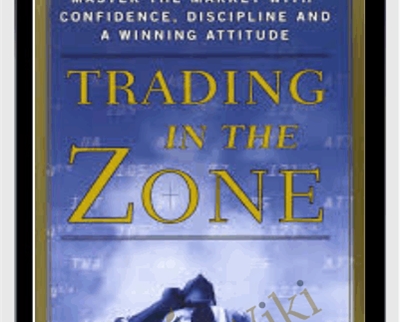$27.00 Original price was: $27.00.$23.00Current price is: $23.00.
In order to determine how well you "think like a trader," take the following Attitude Survey. There are no right or wrong answers.
Your answers are an indication of how consistent your current mental framework is with the way you need to think in order to get the most out of your trading.
 Purchase this course you will earn 23 Points worth of $2.30
Purchase this course you will earn 23 Points worth of $2.30I assume that you already have your own system, your own edge. You must learn to trust your edge. The edge means there is a higher probability of one outcome than another. The greater your confidence, the easier it will be to execute your trades. This book is designed to give you the insight and understanding you need about yourself and the nature of trading, so that actually doing it becomes as easy, simple, and stressfree as when you're just watching the market and thinking about doing it.
In order to determine how well you "think like a trader," take the following Attitude Survey. There are no right or wrong answers.
Your answers are an indication of how consistent your current mental framework is with the way you need to think in order to get the most out of your trading.
Get Trading in the Zone – Mark Douglas, Only Price $27
ATTITUDE SURVEY
1. To make money as a trader you have to know what the market is going to do next. Agree Disagree
2. Sometimes I find myself thinking that there must be a way to trade without having to take a loss. Agree Disagree
3. Making money as a trader is primarily a function of analysis. Agree Disagree
4. Losses are an unavoidable component of trading. Agree Disagree
5. My risk is always defined before I enter a trade. Agree Disagree
6. In my mind there is always a cost associated with finding out what the market may do next. Agree Disagree
7. I wouldn't even bother putting on the next trade if I wasn't sure that it was going to be a winner. Agree Disagree
8. The more a trader learns about the markets and how they behave, the easier it will be for him to execute his trades. Agree Disagree
9. My methodology tells me exactly under what market conditions to either enter or exit a trade. Agree Disagree
10. Even when I have a clear signal to reverse my position, I find it extremely difficult to do. Agree Disagree
11. I have sustained periods of consistent success usually followed by some fairly drastic draw-downs in my equity. Agree Disagree
12. When I first started trading I would describe my trading methodology as haphazard, meaning some success in between a lot of pain. Agree Disagree
13. I often find myself feeling that the markets are against me personally. Agree Disagree
14. As much as I might try to "let go," I find it very difficult to put past emotional wounds behind me. Agree Disagree
15. I have a money management philosophy that is founded in the principle of always taking some money out of the market when the market makes it available. Agree Disagree
16. A trader's job is to identify patterns in the markets' behavior that represent an opportunity and then to determine the risk of finding out if these patterns will play themselves out as they have in the past. Agree Disagree
17. Sometimes I just can't help feeling that I am a victim of the market. Agree Disagree
18. When I trade I usually try to stay focused in one time frame. Agree Disagree
19. Trading successfully requires a degree of mental flexibility far beyond the scope of most people. Agree Disagree
20. There are times when I can definitely feel the flow of the market; however, I often have difficulty acting on these feelings. Agree Disagree
21. There are many times when I am in a profitable trade and I know the move is basically over, but I still won't take my profits. Agree Disagree
22. No matter how much money I make in a trade, I am rarely ever satisfied and feel that I could have made more. Agree Disagree
23. When I put on a trade, I feel I have a positive attitude. I anticipate all of the money I could make from the trade in a positive way. Agree Disagree
24. The most important component in a trader's ability to accumulate money over time is having a belief in his own consistency. Agree Disagree
25. If you were granted a wish to be able to instantaneously acquire one trading skill, what skill would you choose?
26. I often spend sleepless nights worrying about the market. Agree Disagree
27. Do you ever feel compelled to make a trade because you are afraid that you might miss out? Yes No
28. Although it doesn't happen veiy often, I really like my trades to be perfect. When I make a perfect call it feels so good that it makes up for all of the times that I don't. Agree Disagree
29. Do you ever find yourself planning trades you never execute, and executing trades you never planned? Yes No
30. In a few sentences explain why most traders either don't make money or aren't able to keep what they make.
Set aside your answers as you read through this book. Afte you've finished the last chapter ("Thinking Like a Trader"), take the Attitude Survey againu2014it s reprinted at the back of the book. You may be surprised to see how much your answers differ from the first time.
Get Trading in the Zone – Mark Douglas, Only Price $27
ACKNOWLEDGMENTS
I would especially like to thank all of the traders who bought the signed limited edition manuscript of the first seven chapters of this book. Your feedback gave me the inspiration to add the additional four chapters.
Next, I would like to thank fellow traders Robert St. John, Greg Bieber, Larry Pesavento, and Ted Hearne for their friendship and the special ways in which each of them contributed to the development
of this book.
I would also like to acknowledge my friend, Eileen Bruno, for editing the original manuscript; and, at Prentice Hall, Ellen Schneid Coleman, Associate Publisher, for her professionalism and help in smoothing the path to publication, and Barry Richardson, Development Editor, for his help in shaping the introduction. His time and talent are greatly appreciated.
- CHAPTER 1
- CHAPTER 1
- THE ROAD TO SUCCESS:
- FUNDAMENTAL, TECHNICAL,
- OR MENTAL ANALYSIS?
IN THE BEGINNING: FUNDAMENTAL ANALYSIS
Who remembers when fundamental analysis was considered the only real or proper way to make trading decisions? When I started trading in 1978, technical analysis was used by only a handful of traders, who were considered by the rest of the market community to be, at the very least, crazy. As difficult as it is to believe now, it wasn't very long ago when Wall Street and most of the major funds and financial institutions thought that technical analysis was some form of mystical hocus-pocus.
Now, of course, just the opposite is true. Almost all experienced traders use some form of technical analysis to help them formulate their trading strategies. Except for some small, isolated pockets in the academic community, the "purely" fundamental analyst is virtually extinct. What caused this dramatic shift in perspective? I'm sure it's no surprise to anyone that the answer to this question is very simple:
Money! The problem with making trading decisions from a strictly fundamental perspective is the inherent difficulty of making money consistently using this approach.
For those of you who may not be familiar with fundamental analysis, let me explain. Fundamental analysis attempts to take into consideration all the variables that could affect the relative balance or imbalance between the supply of and the possible demand for any particular stock, commodity, or financial instrument. Using primarily mathematical models that weigh the significance of a variety of factors (interest rates, balance sheets, weather patterns, and numerous others), the analyst projects what the price should be at some point in the future.
The problem with these models is that they rarely, if ever, factor in other traders as variables. People, expressing their beliefs and expectations about the future, make prices moveu2014not models. The fact that a model makes a logical and reasonable projection based on all the relevant variables is not of much value if the traders who
Get Trading in the Zone – Mark Douglas, Only Price $27
Tag: Trading in the Zone – Mark Douglas Review. Trading in the Zone – Mark Douglas download. Trading in the Zone – Mark Douglas discount.
Only logged in customers who have purchased this product may leave a review.
Related products
= 125 Points
Uncategorized
Legal Risks in Nursing Documentation – Use Extreme Caution When Skimming the Facts – Rosale Lobo
= 40 Points
Uncategorized
Proven Fall Prevention Strategies: Exercise, Meds Management and Home Modification – Trent Brown
= 40 Points
= 65 Points
Uncategorized
= 85 Points
Uncategorized
= 85 Points
= 72 Points
= 94 Points





Reviews
There are no reviews yet.